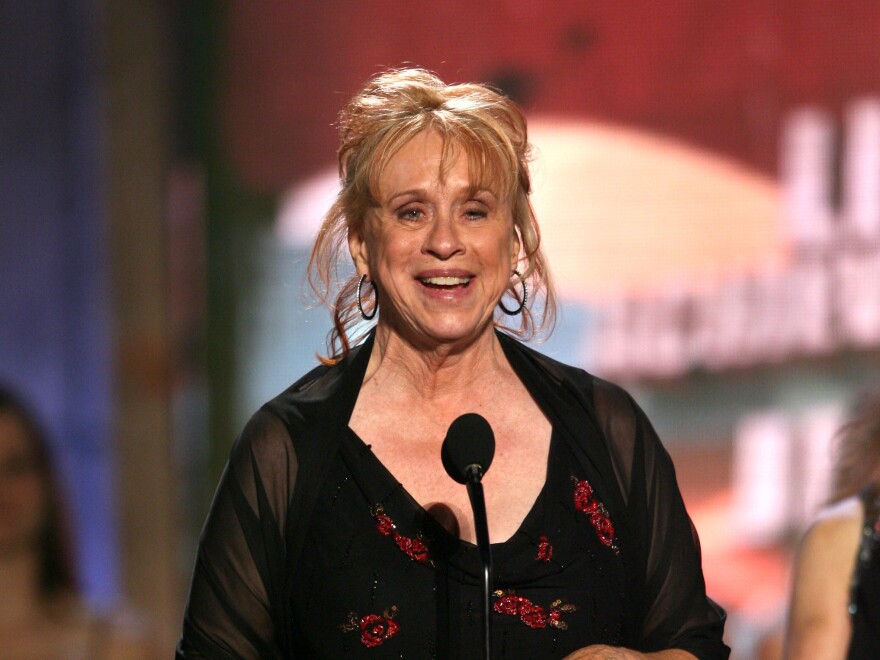In the 1970's, when Wonder Woman, the Bionic Woman or one of Charlie's Angels outran villains, crashed through windows, and leaped over obstacles, viewers were really watching Jeannie Epper, dressed up as a superhero. The groundbreaking Hollywood stuntwoman's career lasted more 70 years, across more than 150 films and TV shows. Epper passed away of natural causes at her home in Simi Valley, California on Sunday. She was 83 years old.
"As stuntwomen, we all descend from this lineage of stuntwomen such as Jeannie," says Katie Rowe, president of the Stuntwomen's Association of Motion Pictures, which Epper co-founded in 1967. "Back in the day, men used to do all the stunts — and they'd throw wigs on them, and dresses. But of course...they don't move like women. So the women decided to get in on this whole racket. And here we are today."
Epper began her career at age nine, in the 1951 film Elopement. After her parents sent her to Swiss finishing school, she returned to Hollywood for bit parts in the John Ford movie Cheyenne Autumn and the TV show The Big Valley. But in the late 1970's, she found more opportunities, when women were given more action-oriented roles. She doubled for Lindsay Wagner on TV's Bionic Woman, and for Kate Jackson on the TV series Charlie's Angels. Her breakthrough role was as Lynda Carter's main stunt double on the TV show Wonder Woman.
"She was always there on this set with me, whenever I had a stunt day," Carter told NPR. "She did all the hard stuff. She set the standard for everyone else. She was the ultimate professional."
I have a lot to say about Jeannie Epper. Most of all, I loved her. I always felt that we understood and appreciated one another.
— Lynda Carter (@RealLyndaCarter) May 6, 2024
After all, it was the 70s. We were united in the way that women had to be in order to thrive in a man’s world, through mutual respect, intellect and… pic.twitter.com/ghxY2JT5UP
Carter says the production initially cast a stunt man as her double. "They put a guy with a hairy chest in a Wonder Woman costume — a man with a square, chunky body," she recalls. "You couldn't get the camera far enough to know that it wasn't a woman's body with zero curves, just hairy arms and hairy armpits, and it just wasn't gonna work." Carter says they brought in Jeannie Epper, "and it was perfect."
Carter says her double was an expert at horseback riding, and for other stunts, Epper trained or helped find other stuntwomen to do high falls, ride motorcycles, perform martial arts or do whatever was necessary for the scene. Back then, she says, the stunts were practical, without post-production effects such as CGI or A.I.
Entertainment Weekly once called Epper "the greatest stuntwoman who ever lived." She came from a family dynasty of stunt performers. In fact, according to <i>The Hollywood Reporter</i>, director Steven Spielberg called them "Flying Wallendas of film," comparing them to the famous circus family. Her father John Epper had been a stunt double for actors Gary Cooper, Errol Flynn and Ronald Reagan. Her sisters and brothers, Tony, Margo, Gary, Andy and Stephanie also worked in stunts. Her children and grandchildren have continued in her footsteps.
Epper had a long list of credits; She did cat fights on the soap opera Dynasty and tumbled down a mudslide for Kathleen Turner in Romancing the Stone. She did the stunt driving for Shirley MacLaine in the Oscar-winning 1983 film Terms of Endearment. She also did stunts in such films as Close Encounters of the Third Kind, Minority Report, and more recently, The Fast and the Furious: Tokyo Drift and The Amazing Spider-Man.
Over the years, Epper did get hurt a few times on set, as she told Dan Rather in 1979 on CBS Sunday Morning. She was trapped in a burning cabin for the TV show Lancer, and she was smashed on the head with a heavy picture frame in the movie Foxy Brown. But for the most part, Epper avoided any serious injuries.
Rowe says Epper always regaled others on set with stories about making movies, and gently offered advice. And even in her later years, Epper continued working. "She'd be the grandma you saw on TV that got knocked down in the grocery store," says Rowe. "She had a long and varied career and she was tough as nails...she was just a hoot. "
Carter called Epper a real-life Wonder Woman. "When you accomplish, with grace and honor, like she did," she said, "That is the pulse factor of a Wonder Woman, someone that reaches out to help others, to include others, to change the world around them, in small and large ways."
Copyright 2025 NPR



